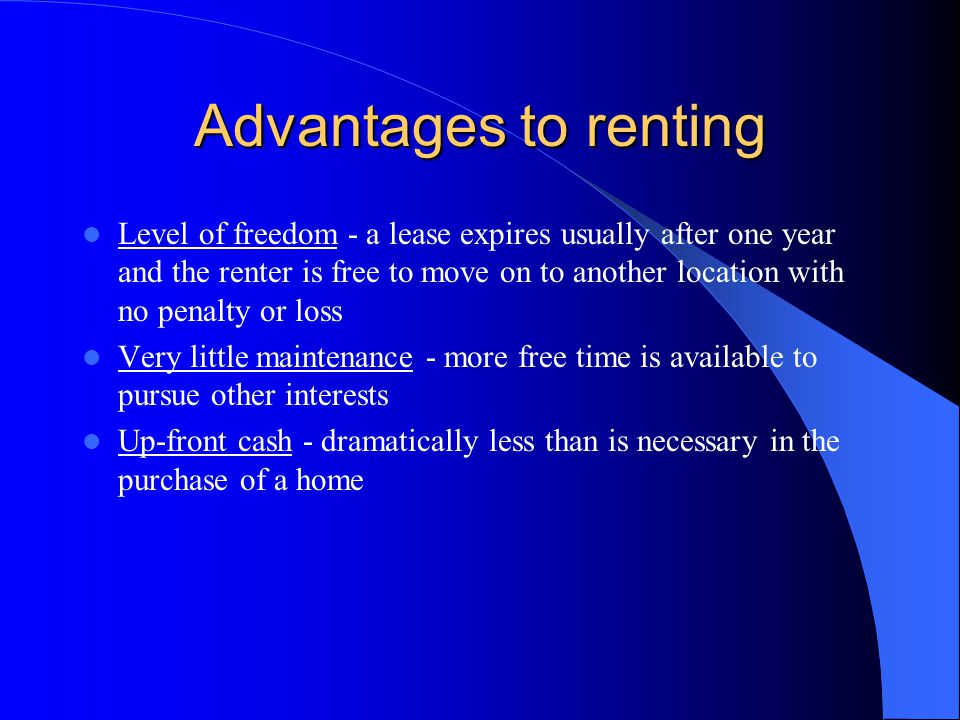The Benefits of Renting
Renting a property has become an increasingly popular option for many individuals and families. In this article, we will discuss the various benefits of renting and how it can be a favorable choice for individuals in different life stages and circumstances.
Flexibility and Mobility
One of the key advantages of renting is the flexibility it offers. Renting provides individuals with the freedom to move more easily compared to homeownership. Whether it’s due to job changes, personal preferences, or the need for a larger or smaller space, renting allows for greater mobility without the long-term commitment of owning a property.
Financial Considerations
Renting can be a financially advantageous option, especially for those who are not ready to commit to a mortgage or prefer to allocate their funds elsewhere. Renting eliminates the need for a substantial down payment and the costs associated with property maintenance and repairs, which are typically the responsibility of the landlord.
Access to Amenities
Many rental properties offer access to a wide range of amenities that may be financially out of reach for homeowners. These amenities can include swimming pools, fitness centers, communal spaces, and even concierge services. Renting provides an opportunity to enjoy these amenities without the need for additional expenses or maintenance.
Lower Responsibility and Maintenance
When renting a property, tenants are not responsible for the maintenance and repair costs that come with homeownership. Landlords are typically responsible for ensuring the property is in good condition and addressing any issues that may arise. This relieves tenants of the financial burden and time-consuming tasks associated with home maintenance.
Ability to Test Different Locations
Renting allows individuals to explore and experience different neighborhoods and cities without making a long-term commitment. This is particularly beneficial for those who are unsure about settling in a specific area or want to try out a new location before considering homeownership. Renting provides the flexibility to test different locations and find the perfect fit.

Renting offers numerous benefits, including flexibility, financial advantages, access to amenities, reduced responsibility, and the ability to explore different locations. It is important to carefully consider personal circumstances and preferences when deciding between renting and homeownership. Renting can be an excellent choice for individuals seeking a temporary or flexible living arrangement without the long-term commitment and responsibilities associated with owning a property.
Frequently Asked Questions Benefits of Renting
1. Why should I consider renting instead of buying a property?
There are several benefits of renting a property:
Renting offers flexibility and allows you to easily move to a new location.
You are not responsible for property maintenance and repairs.
Renting can be more affordable than buying, especially in expensive areas.
2. Are there any financial advantages to renting?
Yes, renting can provide financial benefits:
You don’t have to worry about property taxes or homeowners insurance.
You can invest the money saved from not buying a property in other ventures.
Renting allows you to avoid the costs associated with buying a home, such as down payments and closing costs.
3. Can renting be a good option for short-term stays?
Absolutely! Renting is an excellent choice for short-term stays:
You can easily find furnished rental properties, eliminating the need to buy furniture.
Lease terms can be flexible, allowing you to rent for a specific duration.
Renting provides a hassle-free solution for temporary living situations.
4. What are the advantages of renting in terms of maintenance?
Renting offers maintenance benefits:
The landlord or property management is responsible for property repairs and maintenance.
You don’t have to worry about costly repairs or the hassle of finding reliable contractors.
Major maintenance expenses are not your responsibility.
5. Can renting help me save money?
Yes, renting can help you save money in various ways:
Renting allows you to avoid the costs of property ownership, such as mortgage payments and property taxes.
You can choose a rental property that fits your budget, potentially saving on housing expenses.
You can invest the money saved from not buying a property in other financial opportunities.
6. Is renting a good option for those who frequently relocate?
Yes, renting is an excellent choice for frequent movers:
Renting provides flexibility to move easily without the burden of selling a property.
You can explore different neighborhoods or cities before deciding to settle down.
Lease terms can be shorter, allowing you to move more frequently if needed.
7. Are there any disadvantages to renting?
While there are many benefits, there are a few disadvantages to renting:
You are subject to the rules and regulations set by the landlord or property management.
Renting may not provide the same sense of ownership and long-term stability as owning a property.
Rent payments do not contribute to building equity or asset value.
8. Can I personalize a rental property to my liking?
Most landlords allow personalization within reason:
You can often paint the walls or hang pictures, as long as you restore the property to its original condition when moving out.
Discuss any desired modifications with the landlord to ensure compliance with the rental agreement.
Some landlords may have restrictions on major alterations or renovations.
9. Can renting provide a sense of community?
Yes, renting can offer a sense of community:
Many rental properties have shared amenities like gyms, pools, or common areas, fostering interaction among residents.
You can meet neighbors who may have similar interests or lifestyles.
Some rental communities organize social events or activities for residents.
10. How can I find the right rental property for me?
Here are some tips to find the perfect rental property:
Define your budget and desired location.
Utilize online rental platforms and real estate websites to search for available properties.
Contact local real estate agents or property management companies for assistance.
Schedule property visits to evaluate the condition and suitability of the rental.




